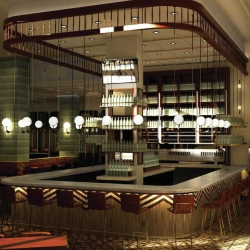
A recent law would allow casinos to serve alcohol to active bettors on the gambling floor until 4am local time.
The Massachusetts Gaming Commission is considering whether to allow MGM Springfield’s request to serve alcohol past the mandated “last call“. In Massachusetts last call is 2am, but a recent amendment to the state law allows casinos which seek permission to continue serving for two more hours.
The law allows casinos to serve drinks until 4am under specific circumstances — only on the gaming floor and only to active gamblers. If gamblers stay up until 4am to bet on the slots, in the poker room, or at the craps table, they will be allowed to drink until 4am.
The idea behind the law is gamblers would leave the resort, if they were not allowed to enjoy the normal refreshments gamblers receive throughout their trip to the casino.
Gamblers often keep different hours, because they are on holiday or in a celebratory mood. Thus, they are allowed to drink alcohol so long as they keep playing. The casino is a 24-hour gaming setting, so they are considered to be in a safer drinking environment.
Why 4am Last Call Makes Sense for Casinos
MGM Springfield General Manager Alex Dixon said, “Our business is open 24-hours, so we expect people to be there 24-hours, but only if they are actively gaming will they be able to consume [alcohol] after that 2 a.m. time.”
Land-based casinos say that extending last call helps the casino operation run in a more efficient fashion, because they can give patrons full service throughout their gaming sessions. This keeps players at the table longer, which means higher tax revenues at the end of the year for the commonwealth. That is how the extended last call was solds to lawmakers.
Gaming Commission Asked for Public Comments
Since it received the request, the Massachusetts Gaming Commission asked for public comments from voters and purveyors of public opinion. A commission vote on the request is expected on June 21st.
Opening the question to public debate should bring the Commission some heated opinions. If the MGM Springfield alcohol debate is anything like the one before the original measure passed in the legislature, when State Senator Stan Rosenberg in particular spoke out against the measure, then a combination of local businesses and alcohol control groups will speak out.
Business Argument vs. 4am Last Call
Local businesses which sell alcohol do not like when one of their own gets a special exemption. If local bars, clubs, and taverns are expected to stop selling at 2am, then they do not understand why a casino is allowed to keep its bars open later.
In other states, many alcohol vendors complained that their patrons left before last call, so they could go to the casinos to continue their night. The business owners complained that such laws actually lost them revenues.
Social Argument vs. 4am Last Call
Parents groups and alcohol addiction groups warn against setting such a late hour for last call. They point out that last call was set at 2am for particular reasons. Such groups believe that a 4am last call ignore good logic.
For instance, many commuters leave for work at 5am. While 4am last call might not matter on the weekends, such laws would apply to weekday mornings, too. While many gamblers stay the night at a casino-resort, many get on the road sometime after last call.
If you assume that many spend an hour or so drying out before getting on the Springfield roads, a 4am last call means those tired and perhaps still-inebriated drivers would be getting on the roads between 5am and 6am in the morning — during workday commutes.
Gaming Commission to Support Extended Last Call
It is hard to imagine the Massachusetts Gaming Commission turning down MGM Springfield’s request for a 4am last call extension. This law was written to cater to the needs of Encore Boston Harbor and MGM Springfield, the two major land-based casinos being built at the time the new alcohol consumption law was enacted.
Lawmakers planned for this law to help the businesses in Springfield and Everett. MGM Resorts invested $960 million, so lawmakers want to help such a massive outside business investor. The same goes for Wynn Resorts, which invested $2.4 billion.
The call for opinions therefore seems to be a formality, or going through the motions of a public discourse. No doubt, the various groups will make their points. It would be shocking if the Gaming Commission acted on those dissenting opinions. The decision comes in less than a month, on June 21.
